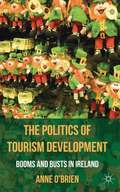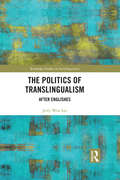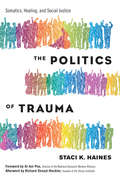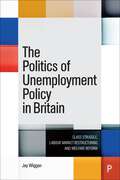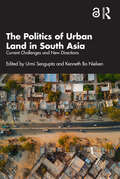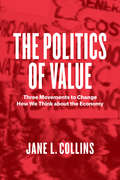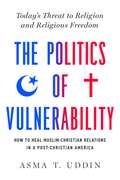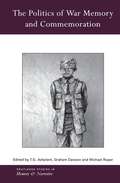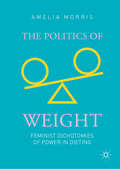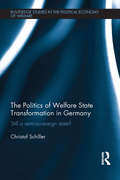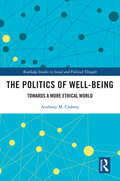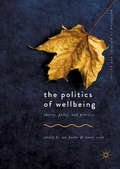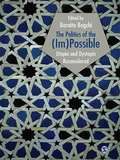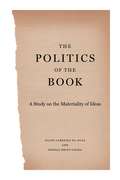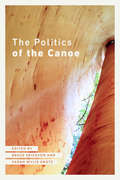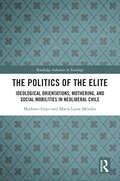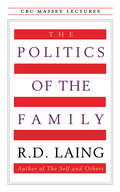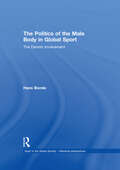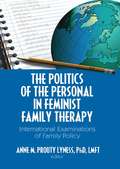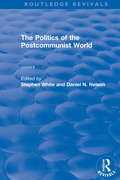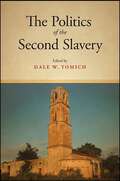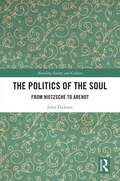- Table View
- List View
The Politics of Tourism Development: Booms and Busts in Ireland
by Anne O’BrienMoving beyond both tourism and politics literatures' current understandings of how tourism is developed, this book offers an original theory of interlocking regimes to account for the manner in which public and private bodies either facilitate or prevent development within tourism.
The Politics of Translingualism: After Englishes (Routledge Studies in Sociolinguistics)
by Jerry Won LeeTranslingualism refers to an orientation in scholarship that recognizes the fluidity of language boundaries and endorses a greater tolerance for the plurality of Englishes worldwide. However, it is possible that translingualism exacerbates the very problems it seeks to redress? This book seeks to destabilize underlying attitudes inherent in the narrowly conceptualized view of Englishes by pushing forward current theories of translingualism and integrating cutting-edge scholarship from sociolinguistics, critical theory, and composition studies. The Politics of Translingualism pays particular attention to the politics of evaluating language, including different Englishes, at a moment of unprecedented linguistic plurality worldwide. The book draws on analyses of a wide range of artifacts, from television commercials, social media comments, contemporary and canonical poetry, contemporary and historical English phrasebooks, commercial shop signs, and the writing of multilingual university students. The volume also looks outside the classroom, featuring interviews with recruiters in a number of professional fields to examine the ways in which language ideologies about Englishes can impact students entering the workforce. This book offers an innovative take on current debates on multilingualism and global Englishes, serving as an ideal resource for students and scholars in applied linguistics, sociolinguistics, composition studies, education, and cultural studies.
The Politics of Trauma: Somatics, Healing, and Social Justice
by Staci HainesAn essential tool for healers, therapists, activists, and survivors of trauma who are interested in a justice-centered approach to somatic transformationThe Politics of Trauma offers somatics with a social analysis. This book is for therapists and social activists who understand that trauma healing is not just for individuals--and that social change is not just for movement builders. Just as health practitioners need to consider the societal factors underlying trauma, so too must activists understand the physical and mental impacts of trauma on their own lives and the lives of the communities with whom they organize. Trauma healing and social change are, at their best, interdependent. Somatics has proven to be particularly effective in addressing trauma, but in practice it typically focuses solely on the individual, failing to integrate the social conditions that create trauma in the first place. Staci K. Haines, somatic innovator and cofounder of generative somatics, invites readers to look beyond individual experiences of body and mind to examine the social, political, and economic roots of trauma--including racism, environmental degradation, sexism, and poverty. Haines helps readers identify, understand, and address these sources of trauma to help us bridge individual healing with social transformation.
The Politics of Unemployment Policy in Britain: Class Struggle, Labour Market Restructuring and Welfare Reform
by Jay WigganThis book provides an account of the evolution of social security and employment policy and governance in Britain between 1973 and 2023. It explains how this remaking of policy and governance shaped, and was shaped by, the transformation of the labour market and power of claimants and workers. Advancing a class-centred explanation, the text situates contemporary working age active labour market policy as the contingent outcome of a long struggle over curtailment of labour autonomy and the challenges arising from policy ‘success’ for securing social cohesion, state legitimacy and better economic conditions for growth.
The Politics of Urban Land in South Asia: Current Challenges and New Directions (Cities and the Urban Imperative)
by Kenneth Bo Nielsen Urmi SenguptaCities in South Asia are homes to one of the highest concentrations of people anywhere in the world and the allocation of land and urban resources and the benefits that can be derived from them in this region have become increasingly contested. This book explores the politics of urban land in South Asia and the challenges related to their respective urban futures.For most people, land comes at a premium, and as a result conflicts and contestations over land and urban resources are rife in countries such as India, Bangladesh, Pakistan, Sri Lanka and Nepal, as witnessed in the many struggles of low-income groups and vulnerable or marginalised communities to fight off dispossession or displacement. This book maps current challenges shared across national borders and charts out new directions for future research and land policy. With contributions from emerging and established authors, the book offers a critical accounting of the situation that exists in urban South Asia, while also critically engaging with the current challenges and future directions for land use and land politics.The book will be useful to students and researchers of public policy, development studies, economics, urban and regional development studies, and sociology as well as to policy makers, real estate professionals, and commercial firms engaged in property market/real estate study in Asia.Chapter 10 of this book is freely available as a downloadable Open Access PDF at http://www.taylorfrancis.com under a Creative Commons [Attribution-Non Commercial-No Derivatives CC-BY-NC-ND 4.0 license.
The Politics of Value: Three Movements to Change How We Think about the Economy
by Jane L. CollinsThe Great Recession not only shook Americans’ economic faith but also prompted powerful critiques of economic institutions. This timely book explores three movements that gathered force after 2008: the rise of the benefit corporation, which requires social responsibility and eschews share price as the best metric for success; the emergence of a new group, Slow Money, that fosters peer-to-peer investing; and the 2011 Wisconsin protests against a bill restricting the union rights of state workers. Each case shows how the concrete actions of a group of citizens can prompt us to reflect on what is needed for a just and sustainable economic system. In one case, activists raised questions about the responsibilities of business, in the second about the significance of local economies, and in the third about the contributions of the public sector. Through these movements, Jane L. Collins maps a set of cultural conversations about the types of investments and activities that contribute to the health of the economy. Compelling and persuasive, The Politics of Value offers a new framework for viewing economic value, one grounded in thoughtful assessment of the social division of labor and the relationship of the state and the market to civil society.
The Politics of Vulnerability: How to Heal Muslim-Christian Relations in a Post-Christian America: Today's Threat to Religion and Religious Freedom
by Asma T. UddinA religious liberty lawyer and acclaimed author reveals the root of America's polarization inside the Muslim and evangelical Christian divide—and how it can be healed.Despite the dire consequences of America's cultural, political, and religious divisiveness, from increasing incivility to discrimination and outright violence, few have been able to get to the core cause of this conflict. Even fewer have offered measures for reconcilliation. Now, in The Politics of Vulnerability, Asma Uddin, American-Muslim public intellectual, religious-liberties attorney, and activist, provides a unique perspective on the complex political and social factors contributing to the Muslim-Christian divide. Unlike other analysts, Uddin asks what underlying drivers cause otherwise good people to do—or believe—bad things? Why do people who value faith support of measures that limit others, especially of Muslims&’, religious freedom and other rights?&’ Uddin humanizes a contentious relationship by fully embracing both sides as individuals driven by very human fears and anxieties. Many conservative Christians fear that the Left is dismantling traditional &“Christian America&” to replace it with an Islamized America, a conspiratorial theory that has given rise to an &“evangelical persecution complex,&” a politicized vulnerability. Uddin reveals that Islamophobia and other aspects of the conservative Christian movement are interconnected. Where does hate come from and how can it be conquered? Only by addressing the underlying factors of this politics of vulnerability can we begin to heal the divide.
The Politics of War Memory and Commemoration
by T. G. Ashplant Graham Dawson Michael RoperWar memory and commemoration have had increasingly high profiles in public and academic debates in recent years. This volume examines some of the social changes which have led to this development, among them the passing of the two World Wars from survivor into cultural memory. Focusing on the politics of war memory and commemoration, the book illuminates the struggle to install particular memories at the centre of a cultural world, and offers an extensive argument about how the politics of commemoration practices should be understood.
The Politics of Weight: Feminist Dichotomies of Power in Dieting
by Amelia MorrisThis book speaks to the politics of weight through an interrogation of dieting, power and the body. In feminist theory, there is no greater site of contestation than that of the body, and Morris explores how these debates often become centred upon a dichotomy between oppression and liberation. Whilst there is a vast diversity of scholarship that challenges this binary including post-colonial, post-structuralist and Marxist feminist work, the dichotomy nevertheless endures. The Politics of Weight argues that the ‘feminine’ body is not simply a site of oppression or liberation by drawing upon the intersections that exist between Foucault’s Discipline and Punish and post-structuralist feminist work on the body. This provides a unique lens for exploring weight. Through in-depth analysis of interviews with women who seemingly sit on either side of the ‘oppression’ and ‘liberation’ debate, members of dieting clubs and fat activists, the book highlights the complexities that surround women’s relationship to weight and the body. Likewise it draws upon the wealth of black feminist scholarship to explore the discourses surrounding Oprah Winfrey’s dieting ‘journey,’ seeking to demonstrate how discipline and race interact and how this plays out in dieting and weight. The Politics of Weight will be of interest to students and scholars across a range of disciplines, including gender studies, sociology, geography and political science.
The Politics of Welfare State Transformation in Germany: Still a Semi-Sovereign State? (Routledge Studies in the Political Economy of the Welfare State)
by Christof SchillerHow can we best analyse contemporary welfare state change? And how can we explain and understand the politics of it? This book contributes to these questions both empirically and theoretically by concentrating on one of the least likely cases for welfare state transformation in Europe. It analyzes in detail how and why institutional change has taken Germany’s welfare state from a conservative towards a new work-first regime. Christof Schiller introduces a novel analytical framework to make sense of the politics of welfare state transformation by providing the missing link: the capacity of the core executive over time. Examining the policy making process in labour market policy in the period between 1980 and 2010, he identifies three different policy making episodes and analyses their interaction with developments and changes in such policy areas as pension policy, family policy, labour law, tax policy and social assistance. The book advances existing efforts aimed at conceptualizing and measuring welfare state change by proposing a clear-cut conceptualization of social policy regime change and introduces a comprehensive analysis of the transformation of the welfare-work nexus between 1980 and 2010 in Germany. This book will be of interest to students and scholars of social policy, comparative welfare state reform, welfare politics, government, governance, public policy, German politics, European politics, political economy, sociology and history.
The Politics of Well-Being: Towards a More Ethical World (Routledge Studies in Social and Political Thought)
by Anthony M. ClohesyThe Politics of Well-Being argues that the relationship between well-being and ethical life has been overlooked. The more specific argument of the book is that ethical life requires political engagement, and the emergence of a society committed to critical thinking. It is argued that these conditions allow for our ordination and confirmation as ethical subjects. While well-being can be experienced in different ways, it is claimed that, after experience of ethical life, a more sustainable form of it is revealed to us, a form which we would be drawn to preserve, a form which can be constituted as an object of hope. While the book draws on philosophical themes, its main focus is political. This is because its primary objective is to identify and to examine what needs to be done in order to realise ethical life. Its main focus in this respect is the identification and examination of the barriers which need to be overcome if ethical life is to be realised. It is acknowledged that this will not be an easy task. Indeed, it may be an impossible task. However, despite these barriers, and despite the dark days we are living through, the book is a call to hope rather than a surrender to despair. This book will be of interest to students of politics, psychology, cultural studies, philosophy and sociology, as well as anyone else interested in exploring new ideas about how the make the world a better place.
The Politics of Wellbeing: Understanding The Rise And Significance Of A New Agenda (Wellbeing In Politics And Policy Series)
by Karen Scott Ian BacheThis volume is the first collection in the field of wellbeing studies that places politics centre stage. Through a combination of intellectual inquiry, empirically-grounded research, and investigation across different settings, this book aims to provide fresh insights and develop new lenses through which to understand the rise and significance of the wellbeing agenda. Divided into three parts, it considers how to define wellbeing for public policy; the prospects for wellbeing as a force for political change; and the link between policy agendas and the everyday lives of people. The book explores the key political issues of power, democracy, and the legitimacy of wellbeing evidence in a range of settings – international, national and subnational/substate. The volume will appeal to wellbeing and politics scholars, as well as students and general readers with an interest in these new political agendas.
The Politics of Work–Family Policies
by Patricia BolingThe work-family policies of Sweden and France are often held up as models for other nations to follow, yet political structures and resources can present obstacles to fundamental change that must be taken into account. Patricia Boling argues that we need to think realistically about how to create political and policy change in this vital area. She evaluates policy approaches in the US, France, Germany and Japan, analyzing their policy histories, power resources, and political institutions to explain their approaches, and to propose realistic trajectories toward change. Arguing that much of the story lies in the way that job markets are structured, Boling shows that when women have reasonable chances of resuming their careers after giving birth, they are more likely to have children than in countries where even brief breaks put an end to a career, or where motherhood restricts them to part-time work.
The Politics of the (Im)Possible
by Barnita BagchiThis volume brings together articles on utopia and dystopia in a breadth of disciplines-history, literature, gender studies, political science, sociology, anthropology, and Native American Studies. Utopia and dystopia are modes and resonances present in all parts of the world, not just Europe and white North America. Equally, utopian and dystopian thought and practice are and have always been gendered. Utopia, memory and temporality often intersect in strange and surprising ways. Three dimensions are thus central to the enterprise undertaken in this volume: 1 The relationship between utopia/dystopia and time/memory 2 The focus on Europe and areas outside Europe at the same time 3 The gendered analysis of utopia/dystopia Contributors to this volume include prominent experts in fields as varied as Development Studies, Cultural Studies, Women's Studies and Literature.
The Politics of the Book: A Study on the Materiality of Ideas (Penn State Series in the History of the Book #30)
by Filipe Carreira da Silva Monica Brito VieiraIt is impossible to separate the content of a book from its form. In this study, Filipe Carreira da Silva and Mónica Brito Vieira expand our understanding of the history of social and political scholarship by examining how the entirety of a book mediates and constitutes meaning in ways that affect its substance, appropriation, and reception over time.Examining the evolving form of classic works of social and political thought, including W. E. B. Du Bois’s The Souls of Black Folk, G. H. Mead’s Mind, Self, and Society, and Karl Marx’s 1844 Economic and Philosophic Manuscripts, Carreira da Silva and Brito Vieira show that making these books involved many hands. They explore what publishers, editors, translators, and commentators accomplish by offering the reading public new versions of the works under consideration, examine debates about the intended meaning of the works and discussions over their present relevance, and elucidate the various ways in which content and material form are interwoven. In doing so, Carreira da Silva and Brito Vieira characterize the editorial process as a meaning-producing action involving both collaboration and an ongoing battle for the importance of the book form to a work’s disciplinary belonging, ideological positioning, and political significanceTheoretically sophisticated and thoroughly researched, The Politics of the Book radically changes our understanding of what doing social and political theory—and its history—implies. It will be welcomed by scholars of book history, the history of social and political thought, and social and political theory.
The Politics of the Book: A Study on the Materiality of Ideas (Penn State Series in the History of the Book)
by Filipe Carreira da Silva Monica Brito VieiraIt is impossible to separate the content of a book from its form. In this study, Filipe Carreira da Silva and Mónica Brito Vieira expand our understanding of the history of social and political scholarship by examining how the entirety of a book mediates and constitutes meaning in ways that affect its substance, appropriation, and reception over time.Examining the evolving form of classic works of social and political thought, including W. E. B. Du Bois’s The Souls of Black Folk, G. H. Mead’s Mind, Self, and Society, and Karl Marx’s 1844 Economic and Philosophic Manuscripts, Carreira da Silva and Brito Vieira show that making these books involved many hands. They explore what publishers, editors, translators, and commentators accomplish by offering the reading public new versions of the works under consideration, examine debates about the intended meaning of the works and discussions over their present relevance, and elucidate the various ways in which content and material form are interwoven. In doing so, Carreira da Silva and Brito Vieira characterize the editorial process as a meaning-producing action involving both collaboration and an ongoing battle for the importance of the book form to a work’s disciplinary belonging, ideological positioning, and political significance.Theoretically sophisticated and thoroughly researched, The Politics of the Book radically changes our understanding of what doing social and political theory—and its history—implies. It will be welcomed by scholars of book history, the history of social and political thought, and social and political theory.
The Politics of the Canoe
by Bruce Erickson Sarah Wylie KrotzPopularly thought of as a recreational vehicle and one of the key ingredients of an ideal wilderness getaway, the canoe is also a political vessel. A potent symbol and practice of Indigenous cultures and traditions, the canoe has also been adopted to assert conservation ideals, feminist empowerment, citizenship practices, and multicultural goals. Documenting many of these various uses, this book asserts that the canoe is not merely a matter of leisure and pleasure; it is folded into many facets of our political life. Taking a critical stance on the canoe, The Politics of the Canoe expands and enlarges the stories that we tell about the canoe’s relationship to, for example, colonialism, nationalism, environmentalism, and resource politics. To think about the canoe as a political vessel is to recognize how intertwined canoes are in the public life, governance, authority, social conditions, and ideologies of particular cultures, nations, and states. Almost everywhere we turn, and any way we look at it, the canoe both affects and is affected by complex political and cultural histories. Across Canada and the U.S., canoeing cultures have been born of activism and resistance as much as of adherence to the mythologies of wilderness and nation building. The essays in this volume show that canoes can enhance how we engage with and interpret not only our physical environments, but also our histories and present-day societies.
The Politics of the Elite: Ideological Orientations, Mothering, and Social Mobilities in Neoliberal Chile (Routledge Advances in Sociology)
by María Luisa Méndez Modesto GayoThis book is a study of class formation at the top of the social hierarchies during the turbulent and changing early twenty-first century. Contrary to perceptions that privileged individuals exist according to little more than market and economic logics, the book provides evidence that they are by no means absent from politics and civic engagement. Adopting a focus on reproduction, distinction, and politics, it delves into the complex relationship between cohesion and fragmentation that exists within the most privileged groups formed over the course of the contemporary neoliberal period. By knitting a dialogue between spatial analysis, multiple correspondence analysis, and in-depth interviews, the book provides insights into the intricate relations between institutions and political subjectivities, and the role of space and mothering in the political socialisation of Chile’s most privileged families. The result is a dense description of a social class fragmented by subtle ideological lines based upon economic inheritance, socialisation within homogeneous family environments, paths into the labour market, and social and political activities. This book will constitute a much-needed research resource for academics, students, and professionals in areas such as elite studies, social stratification, inequality, social reproduction, accumulation, political socialisation, and contemporary conservative/progressive views.
The Politics of the Family (The CBC Massey Lectures)
by R.D. LaingIn his 1968 CBC Massey Lectures R. D. Laing discusses how and why we value society's notions of family over our own. Using concepts of schizophrenia, R.D. Laing demonstrates that we tend to invalidate the subjective and experiential and accept the proper societal view of what should occur within the family. A psychoanalyst and psychiatrist, Laing worked at the Tavistock Institute of Human Relations. His books include The Self and Others and The Politics of Experience.
The Politics of the Male Body in Global Sport: The Danish Involvement (Sport in the Global Society - Historical Perspectives)
by Hans BondeDanish sport has been associated with Europe and the World; not least through I.P. Muller and Niels Bukh and the Danish Gymnastics revolution with its emphasis on male aesthetics and hygiene in the first half of the twentieth century. At the same time, Denmark has stood apart from Europe in the early moments of its history of sport with the rural revolution of the farming communities as a statement of political independence and assertion. However, during the German occupation of Denmark, Danish sport was part of a European collaboration which characterized a number of the occupied countries not least in the Nordic area. After the Second World War, Denmark embraced international body cultures with other European nations in particular Eastern martial arts. Denmark too, as part of trends in the European region and the world, became caught up in sport as a powerful contemporary political statement.This book was previously published as a special issue of the International Journal of the History of Sport.
The Politics of the Past in an Argentine Working-Class Neighbourhood
by Lindsay DuboisThe Argentine dictatorship of 1976 to 1983 set out to transform Argentine society. Employing every means at its disposal - including rampant violation of human rights, union busting, and regressive economic policies - the dictatorship aimed to create its own kind of order. Lindsay DuBois's The Politics of the Past explores the lasting impact of this authoritarian transformative project for the people who lived through it. DuBois's ethnography centres on José Ingenieros, a Buenos Aires neighbourhood founded in a massive squatter invasion in the early 1970s, and describes how the military government's actions largely subdued a politically engaged community. DuBois traces how state repression and community militancy are remembered in Joé Ingenieros and how the tangled and ambiguous legacies of the past continued to shape ordinary people's lives years after the collapse of the military regime. This rich and evocative study breaks new ground in its exploration of the complex relationships between identity, memory, class formation, neoliberalism, and state violence.
The Politics of the Personal in Feminist Family Therapy: International Examinations of Family Policy
by Anne M. Prouty LynessAddress the issues vital for women and their familiesTo be most effective, family therapists need to understand precisely what policies are in place and how they influence families and their relationships. The Politics of the Personal in Feminist Family Therapy: International Examinations of Family Policy provides an interdisciplinary look at family public and social policies and the influence they have on families around the globe-all from a feminist perspective. Diverse international family policy experts discuss policies family therapists need to know covering gender, ethnicity, religion, and age, and the effects on women and their families.As international family public policy shifts and changes, women and their families&’ lives are altered in substantial and very personal ways. The Politics of the Personal in Feminist Family Therapy gives therapists a clear view of policies and diverse issues involving family policy, family relationships, and mental health. The book reveals the interaction between policy and practice, interdependence as a principle of child and family policy, ways to increase women&’s labor force participation without causing a fall in birth rates, and intergenerational equity debates around the world. Qualitative studies are presented detailing women&’s experiences of family policies&’ effects on their lives, including their resiliency in times of disruption and their viewpoints on life-altering events that are used to disempower them. Topics in The Politics of the Personal in Feminist Family Therapy include: the interaction of British social policy with feminist practice supportive rather than punitive interventions in the lives of families an examination of the Organization for Economic Cooperation and Development&’s Babies and Bosses report evaluation of international family policies of elder care research into women&’s roles and the way they are shaped in areas of conflict research on Puerto Rican and Dominican women&’s perceptions of divorceThe Politics of the Personal in Feminist Family Therapy is timely, stimulating reading for psychotherapists, family therapists, psychologists, social workers, counselors, feminists/womanists, sociologists, educators and students in family studies, women&’s studies, gender studies, and war studies, and professionals in family policy and family law.
The Politics of the Postcommunist World (Routledge Revivals)
by Stephen White Daniel N. NelsonThis title was first published in 2001. This series brings together the most significant journal articles to appear in the field of comparative politics since the 1970s. The aim is to render accessible to teachers, researchers and students, an extensive range of essays as a basis for understanding established terrain and new ground.
The Politics of the Second Slavery (SUNY series, Fernand Braudel Center Studies in Historical Social Science)
by Dale W. TomichThe creation of new frontiers of slave commodity production and the expansion and intensification of slavery in Brazil, Cuba, and the southern United States were an integral part of the expansion of the world economy during the nineteenth century. Beginning from this vantage point, The Politics of the Second Slavery brings together a group of international scholars to reinterpret pro- and antislavery politics both globally and nationally as part of the forces that were restructuring Atlantic slavery. Individual chapters shed new light on the decolonization and nationalization of slavery in the Americas, the politics of proslavery elites both within particular countries and across the Atlantic region, the abolition of the international slave trade, and slave resistance.
The Politics of the Soul: From Nietzsche to Arendt (Morality, Society and Culture)
by John DicksonThis book takes the form of intellectual histories of eight major representative figures of the twentieth century, who inherited and responded to the spiritual problematic left by Nietzsche. With each figure offering very different ethical and spiritual positions, all shed light on what we mean when we talk confusedly around the topics of politics and religion. With portraits of Max Weber, Georg Lukács, T.S. Eliot, W.H. Auden, Sigmund Freud, Carl Jung, George Orwell and Hannah Arendt, the author explores the ‘latent’ content of their worldview - their moral (or immoral) intention - exposing a political position and the religious position of each figure, thus shedding light on their ultimate values and illuminating their particular picture of the soul, as well as the implications of their vision for religion and politics. As such, The Politics of the Soul will appeal to scholars of sociology and social theory, religion, philosophy, political theory and cultural studies.
